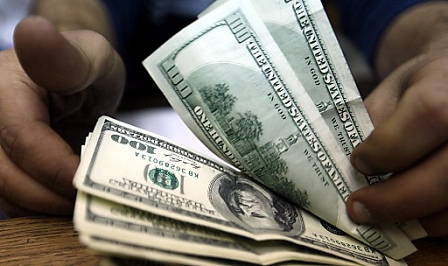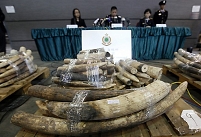Erstellt am: 9. 1. 2013 - 14:44 Uhr
Egypt's economic slide
Subscribe to the Reality Check podcast and get the whole programme after the show.
It's nearly two years since Hosni Mubark was overthrown in the Egyptian revolution. When he fell, there were high hopes among the revolutionaries of a "new Egypt", with a new political system, greater equality and more social justice. It would have been very naive to expect dramatic changes overnight, but two years on, in some respects, things have got worse.

EPA/ADP
There have been elections, there is an elected president, and the country has a new constitution. However, the Islamists are now in charge in the form of the Muslim Brotherhood and their allies, and the divide between them and the liberals and secularists is deeper more bitter than ever.
This divide is fuelled by the country's desperate economic situation. The revolution meant that an already struggling economy was further weakened by a collapse in tourism and loss of confidence among foreign investors, compounded by the global financial crisis
The new government, much like governments everywhere else, is trying to climb out of the pit through borrowing from neighbours and the IMF - but that will mean austerity measures that will hit ordinary people. The way to secure such loans is through cutbacks and reduction of the public debt through privatisation - which is what the Mubarak regime was doing anyway. So, whichever way you look at it, things look tricky for Morsi and co. The policy which might keep the country afloat is firstly what the old regime was doing, and secondly a support loser among Egyptian people.
Now that the new constitution has been adopted, procedures for general elections have to be started within two months. This will create the opportunity for the disaffected revolutionaries to have their say and challenge the Muslim Brotherhood. The danger then is that populist rhetoric will win the day - and that is a very real risk, according to Cengiz Gunay at the Austrian Institute for International Politics.
Dieses Element ist nicht mehr verfügbar
US-Afghanistan talks
Afghan President Karzai is to have talks with President Obama about the future of the US in Afghanistan, amid rumours that the US will withdraw completely by the end of 2014. International Security expert, Paul Rogers, looks at the likely outcome of the talks and the risks involved for both sides.
Dieses Element ist nicht mehr verfügbar
Chavez inauguration postponed
The Venzuelan parliament has decided to postpone for 90 days the inauguration of Hugo Chavez who is still in hospital in Cuba being treated for complications following cancer surgery. Venezuela expert, Julia Buxton, discusses the impact of the decision, and how it is playing out among Chavez supporters and the opposition.
Dieses Element ist nicht mehr verfügbar
Kenya hunts elephant killers

EPA/AH ADP
A family of 11 elephants were killed last weekend in the country's worst ever incident of ivory poaching.
China is a major destination for illegal ivory, where it is used for jewellery, ornaments and medicines.
Rob Brandford from the Kenya-based David Sheldrick Wildlife Trust talks to Chris Cummins about the ivory trade, and the campaign to stop it.
Dieses Element ist nicht mehr verfügbar
CES in Las Vegas
Our technology correspondent, Daniel Sokolov, visits the world's largest tech show - the Consumer Electronics Show in Las Vegas.
Dieses Element ist nicht mehr verfügbar
FM4 Reality Check
Monday to Friday from 12.00 to 14.00, and after the show via Podcast or fm4.orf.at/realitycheck.


